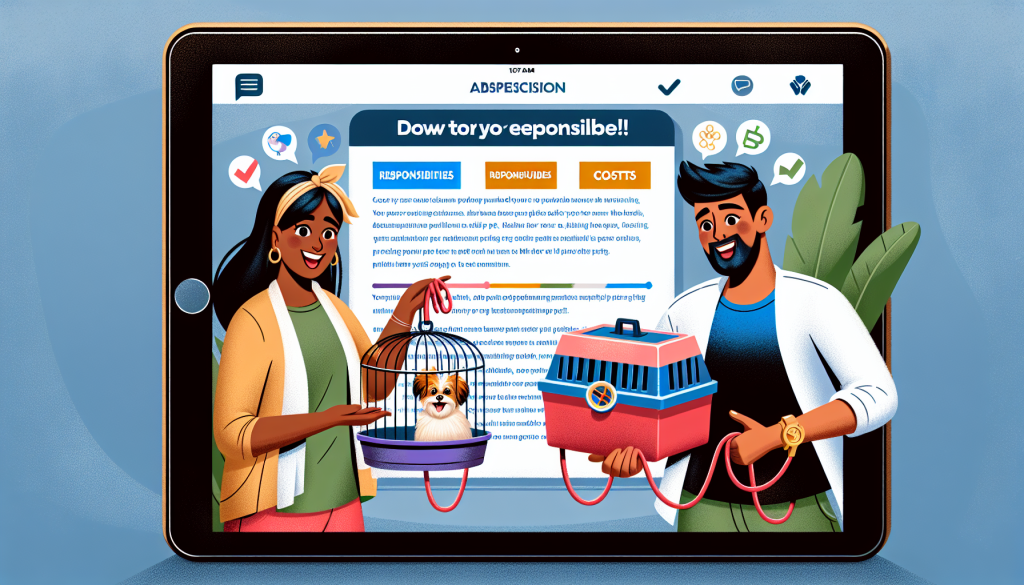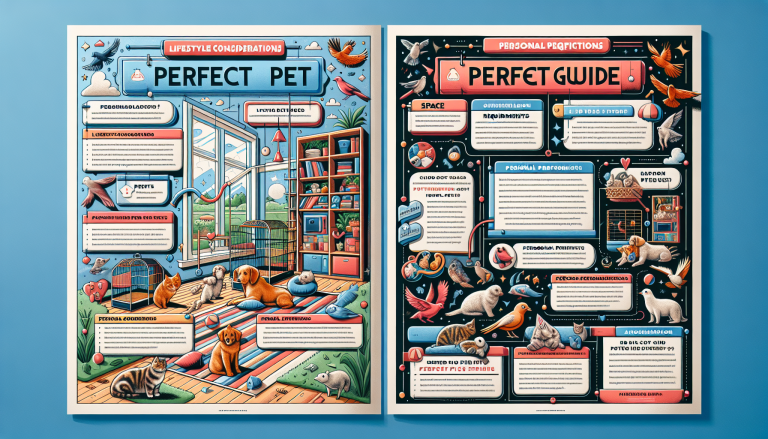Thinking about getting a pet? Before you bring home a furry friend, there are a few things you need to know. From the responsibility of caring for a living creature to the financial commitment involved, this article will provide you with some essential insights to consider before making the big decision. Whether you’re a first-time pet owner or looking to add to your fur family, understanding the key aspects of pet ownership will ensure a happy and fulfilling life for both you and your new companion. So, let’s explore what you need to know before getting a pet.
Table of Contents
ToggleChoosing the Right Pet
When considering getting a pet, it’s important to think about your lifestyle and how a furry friend would fit into it. Different pets have different needs and require varying levels of attention, so it’s crucial to choose a pet that matches your lifestyle. Are you frequently away from home? Do you prefer a more active or a more relaxed lifestyle? These are all factors to consider when selecting the right pet for you.
Researching different breeds is another crucial step in choosing the right pet. Each breed has its own set of characteristics, including exercise needs, temperament, and grooming requirements. By doing your research, you can make an informed decision and find a breed that aligns with your preferences and expectations. Remember that a pet is a long-term commitment, and it’s essential to choose a breed that you’ll be happy with for years to come.
Your living arrangements should also be taken into consideration when deciding on a pet. Do you live in an apartment with limited space, or do you have a spacious backyard? Some pets, like large dogs, may not be suitable for small living spaces, while others, like cats or smaller dog breeds, can adapt well. Additionally, if you rent your home, it’s important to check with your landlord about any pet restrictions or additional fees.
Commitment and Responsibilities
Owning a pet is a significant commitment that requires time, effort, and financial resources. Understanding the time commitment involved is crucial, as pets rely on their owners for daily care and attention. Dogs, for example, require regular exercise, feeding, and playtime to thrive, while cats may need less physical activity but still require mental stimulation and affection. Consider your schedule and how much time you can realistically dedicate to your pet’s needs.
Financial responsibilities are another aspect to consider. Pets come with costs such as food, grooming supplies, toys, and veterinary care. It’s essential to have a budget in place to ensure that you can provide for your pet’s needs without compromising your own financial stability. Remember that veterinary care, including vaccinations, check-ups, and potential emergencies, can be expensive, so having some savings set aside is advisable.
Pets are not just a short-term commitment but a long-term one as well. Many pets live for several years, and some species, like turtles or certain bird species, can have exceptionally long lifespans. Before bringing a pet into your home, think about the long-term implications and whether you can commit to caring for them throughout their lifespan. It’s important to be prepared for the responsibilities and adjustments that come with having a pet for many years.
Pet Care and Maintenance
Feeding and nutrition are essential factors in maintaining a pet’s overall health and well-being. The nutritional needs of pets vary depending on their species, breed, age, and size. It’s important to research and choose a high-quality pet food that meets your pet’s specific dietary requirements. Additionally, portion control is crucial to prevent obesity and related health issues. Consult with your veterinarian to determine the best feeding schedule and diet for your pet.
Grooming and hygiene are necessary for many pets to keep them clean and healthy. Dogs often require regular brushing, nail trims, and bathing to maintain their skin and coat health. Cats, on the other hand, are generally self-groomers and may only require occasional brushing and nail care. It’s important to establish a grooming routine early on and provide your pet with the necessary tools and products for their specific needs.
Exercise and physical activity are vital for a pet’s mental and physical well-being. Dogs, in particular, require regular exercise to burn off excess energy and prevent behavior problems. Daily walks, play sessions, and interactive toys can contribute to a happy and healthy pet. Cats also benefit from physical activity, and providing them with toys and scratching posts can help keep them entertained. Tailor your pet’s exercise routine to their specific needs and energy levels.
Healthcare and Veterinary Services
Regular vaccinations and check-ups are crucial to ensure your pet’s health and prevent the spread of preventable diseases. Your veterinarian will provide a vaccination schedule based on your pet’s age, species, and lifestyle. These vaccinations protect your pet from diseases like rabies, distemper, and feline leukemia. Annual check-ups allow the veterinarian to monitor your pet’s overall health, identify any underlying issues, and provide early intervention if needed.
It’s essential to be prepared for emergencies and after-hours care. Accidents and sudden illnesses can happen at any time, and having a plan in place is crucial. Research emergency veterinary clinics in your area and keep their contact information easily accessible. Familiarize yourself with the signs of common pet emergencies, such as trauma, difficulty breathing, or ingestion of toxic substances. Being prepared can save valuable time in critical situations.
Spaying/neutering and microchipping are important aspects of responsible pet ownership. Spaying or neutering your pet not only helps control the pet population but also contributes to their overall health and reduces the risk of certain diseases. Microchipping is a permanent form of identification that increases the chances of reuniting with your pet if they ever get lost. Discuss these procedures with your veterinarian to understand their benefits and the appropriate timing.
Training and Socialization
Training is essential for any pet to ensure they are well-behaved and can coexist harmoniously with their human family members and other animals. Training not only teaches basic commands but also establishes boundaries and helps prevent behavioral problems. Enroll your pet in obedience classes or seek professional guidance to ensure effective training techniques. Consistency, positive reinforcement, and patience are key when training your pet.
Puppy and kitten socialization is crucial for their future well-being. Exposing them to various experiences, people, and animals at a young age helps them develop confidence and reduces the likelihood of fear or aggression later in life. Socialization should be a gradual process and done in a controlled and positive environment. Consult with your veterinarian or a professional trainer for guidance on how to socialize your young pet effectively.
Behavioral training may be necessary for pets with specific behavioral issues. Aggression, separation anxiety, or compulsive behaviors can all be addressed through behavioral training. Consult with a professional trainer or animal behaviorist to identify the underlying causes and develop a tailored training plan. With patience, consistent training, and positive reinforcement, many behavioral issues can be improved or resolved.
Pet Insurance
Understanding pet insurance is important to protect your pet’s health and your financial well-being. Pet insurance helps cover the cost of veterinary care in case of accidents, injuries, or illness. It can provide peace of mind knowing that you can provide the necessary care for your pet without worrying about high veterinary bills. Research different pet insurance providers, compare their coverage options, and choose a plan that fits your needs and budget.
Different types of coverage may be available depending on the insurance provider and plan. Basic plans typically cover accidents and injuries, while comprehensive plans may also include illness coverage. Some plans may offer additional benefits like preventative care, prescription medications, or alternative therapies. Carefully review the coverage details, including deductibles, annual limits, and reimbursement percentages, to make an informed decision.
Choosing the right insurance provider is crucial for a smooth claims process and reliable coverage. Look for reputable insurance companies with positive customer reviews and a history of providing excellent customer service. Consider the ease of claims submission, the company’s financial stability, and any additional services or benefits they offer. Read the policy documents thoroughly before making a decision to ensure you understand the terms and conditions.
Pet Proofing Your Home
Identifying and removing potential hazards from your home is essential to keep your pet safe. Walk through your home and look for any toxic substances, small objects that could be choking hazards, or cords and electrical wires that could be chewed on. Secure garbage cans and cabinets with hazardous materials, and keep medications and cleaning products out of reach. Also, be aware of plants that could be toxic if ingested.
Secure dangerous areas to prevent your pet from accessing them. Use baby gates, pet doors, or barriers to limit their access to areas like the kitchen, laundry room, or garage, where they could come into contact with dangerous substances or objects. If you have a backyard, ensure it is properly fenced to prevent your pet from escaping and potentially getting injured or lost.
Providing appropriate play and rest areas for your pet is important for their comfort and well-being. Cats benefit from having scratching posts, climbing trees, and cozy beds in various locations around the house. Dogs may appreciate a designated area with their bed, toys, and a safe space to retreat to when they need rest. Tailor these areas to your pet’s preferences and provide them with a sense of security and comfort in your home.
Consideration for Allergy and Asthma Sufferers
If you or a family member suffer from allergies or asthma, it’s crucial to consider hypoallergenic breeds when choosing a pet. Hypoallergenic pets produce fewer allergens and are less likely to trigger allergy symptoms. However, it’s important to note that no pet is entirely hypoallergenic, and individual reactions may vary. Spend time with the specific breed you are considering and have allergy tests done if necessary to determine your sensitivity.
Test your allergies and sensitivities to different pets before making a final decision. Spend time with friends or family members who have pets similar to the breed you are considering. This will give you an idea of how your allergies may be affected and help you make an informed decision. Consulting with an allergist can provide additional guidance and insight into managing allergies while owning a pet.
Implementing effective cleaning routines is crucial to minimize allergens in your home. Regular vacuuming with a HEPA filter, dusting, and washing of bedding will help reduce pet dander. Consider using allergen-resistant covers for furniture and grooming your pet regularly to remove loose hair and dander. Keeping your home clean and maintaining good indoor air quality can help minimize the impact of allergies or asthma.
Preparing for Travel and Vacations
Before traveling with your pet, it’s important to find pet-friendly accommodation. Not all hotels or rental properties allow pets, so be sure to research and book in advance. Look for accommodations that have designated pet-friendly rooms or offer special amenities for pets, such as fenced areas or pet-sitting services. Take into consideration the specific needs and comfort of your pet to ensure a stress-free experience.
Planning for transportation is crucial when traveling with your pet. Many airlines have specific guidelines and procedures for traveling with pets, so be sure to familiarize yourself with their policies. If driving, ensure that your pet is secure in a crate or with a seat belt harness. Pack essentials like food, water, medication, and comfort items to keep your pet comfortable and entertained during the journey.
Organizing a pet-sitter or boarding kennel is necessary if you cannot take your pet with you on vacation. Finding a reliable and trustworthy pet-sitter or boarding facility is crucial to ensure that your pet receives proper care and attention in your absence. Ask for recommendations from friends, family, or your veterinarian, and schedule a trial period to ensure compatibility before leaving your pet in their care.
Dealing with Pet Loss and Grief
Understanding the emotional impact of losing a pet is crucial to navigate the grieving process. Losing a beloved pet can be incredibly difficult, and it’s important to give yourself permission to grieve and process your emotions. Remember that everyone grieves differently, and there is no right or wrong way to mourn the loss of a pet. Surround yourself with understanding and supportive friends or family members who can provide comfort during this time.
Coping strategies and support groups can provide solace and help you navigate the grieving process. Consider joining a support group specifically for pet loss or seeking the guidance of a grief counselor who specializes in this area. Engaging in activities that bring you joy, such as creating a memorial for your pet or journaling your thoughts and feelings, can also be therapeutic. Give yourself time and space to heal, and remember that it’s normal to feel a range of emotions during this time.
Honoring your pet’s memory can be a beautiful way to celebrate their life and the bond you shared. Create a memorial garden or dedicate a special area in your home to your pet, complete with their photo and favorite toys or belongings. Planting a tree or donating to an animal-related charity in your pet’s name can also be a meaningful way to honor their memory. Find what resonates with you and allows you to remember your pet with love and gratitude.
In conclusion, getting a pet is a significant decision that requires careful consideration and preparation. By considering your lifestyle, researching different breeds, and understanding the responsibilities involved, you can make an informed decision. Providing your pet with proper care, veterinary services, training, and a safe environment ensures their well-being and strengthens the bond between you. Remember that owning a pet is a long-term commitment filled with love, joy, and occasional challenges, but the rewards are immeasurable.








